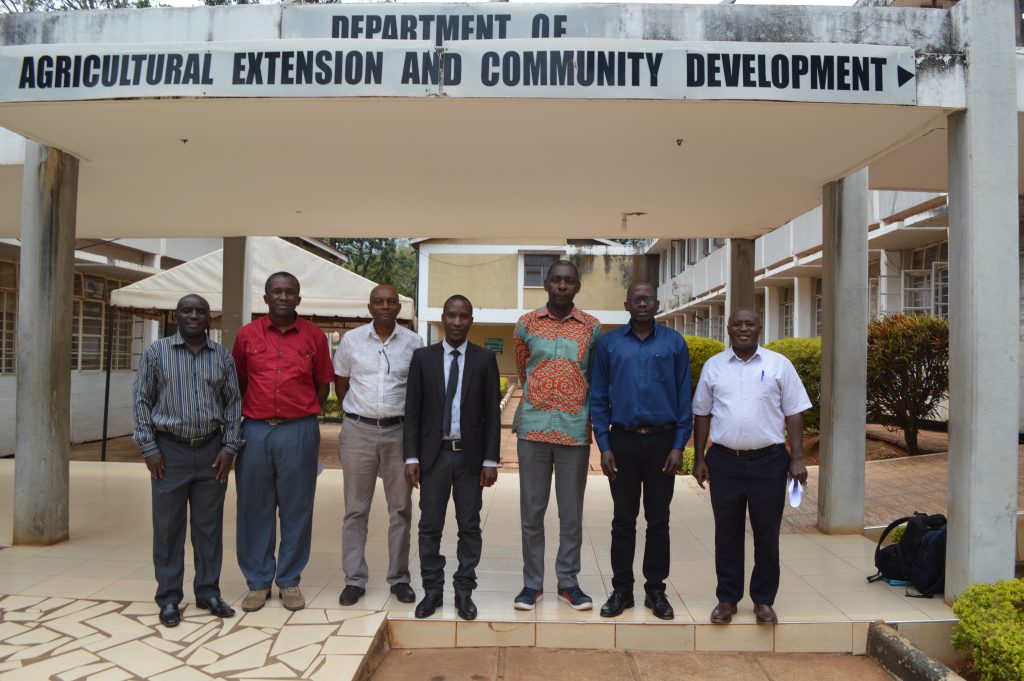 Mr. Yasin John Yasin, a Masters candidate from the Department of Agricultural Extension and Community Development has successfully defended his MSc dissertation. The title of the dissertation is: ” Contribution of Extension Services to Urban Agriculture. A Case of Vegetable Production in Morogoro Municipality Tanzania.” The Supervisors of the thesis are: Dr. S.C. Haule and Prof. Z.S.K. Mvena. The Venue: was ARI PhD Room, Edward Moringe Campus, Morogoro.
Mr. Yasin John Yasin, a Masters candidate from the Department of Agricultural Extension and Community Development has successfully defended his MSc dissertation. The title of the dissertation is: ” Contribution of Extension Services to Urban Agriculture. A Case of Vegetable Production in Morogoro Municipality Tanzania.” The Supervisors of the thesis are: Dr. S.C. Haule and Prof. Z.S.K. Mvena. The Venue: was ARI PhD Room, Edward Moringe Campus, Morogoro.
 Below is an extended abstract:
Below is an extended abstract:
This study determined the contribution of extension services to urban agriculture, a case of vegetable production in Morogoro Municipality, Tanzania. The primary objective of this study was to determine the contribution of extension services on vegetable production in Morogoro Municipality. Specifically, the study inquired about the kind of agricultural information needed by vegetable farmers to perfect their day-to-day production practices, sources of agricultural information accessed by vegetable farmers, and farmers’ perceived implication of agricultural extension services in urban vegetable production. To achieve these objectives, a descriptive survey design incorporating a mixed approach of both quantitative and qualitative methods was employed. Data were collected using questionnaires, and interview schedules. The population of the study comprised 60 vegetable farmers, four lead farmers, and two Ward extension officers. Both vegetable farmers were selected conveniently, and key informants were selected purposively from four purposively selected wards in Morogoro Municipality, Kichangani, Mazimbu, Kingo, and Magadu which are vegetable crop production areas. Subsequently, the collected data were entered into a computer, underwent cleaning, and were then subjected to analysis. The Statistical Package for Social Science (SPSS) version 20 computer software was used to analyze quantitative data and qualitative data were analyzed through content analysis. Descriptive statistics such as frequency, percentages, mean and standard deviation were used to analyze the variables. Firstly, the findings revealed that farmers needed information on pest and disease control, amount and type of fertilizer to apply, produce market, and storage. Fellow farmers (friends and colleagues) ranked as an important source of information followed by public extension officers, researchers, NGOs, input suppliers, Nanenane exhibitions, individual farmers, social networks, books and fliers, and hired extension officers. The findings further revealed that farmers’ perceptions implied that there is inadequate provision of technical knowledge, limited extension services increase the difficulties in overcoming vegetable production challenges, low demonstration of modern crop production principles, and public extension services contribution is not appreciated.
The current study confirms the Information-seeking behavior model depicts that information-seeking behavior is a consequence of one’s information needs, the author further indicated that information-seeking behavior is a subject of the perceived information needs of the user. Also, the study employed agency theory and service delivery theory in combination to provide a robust framework for analyzing extension services among Morogoro urban vegetable farmers. The study concluded that, although extension services are very crucial in promoting vegetable production in Urban areas of Morogoro, vegetable farmers rely on interpersonal networks (family and colleagues) as a source of agricultural information to address production challenges such as diseases and pests, storage of harvest and market of the produce. Further, the study concluded that many vegetable producers are still struggling with limited knowledge and skills in producing vegetables and they still had a challenge accessing and utilizing the information from extension services specifically from public extension officers.
Therefore, the municipal council should develop a sound and long-term strategy to ensure easy access of extension services to address these challenges by offering training, seminars, workshops, and symposia to sensitize farmers with more up-to-date knowledge and skills should be organized more frequently to shape the farmers’ thinking, knowledge and attitude. The training should also target to improve farmers’ awareness of the available information sources such as mass media, public libraries and exhibitions including user skills for optimal utilization of these resources. Lastly, the Municipal council needs to enhance involvement of the private sector in promoting easily available extension services around the city.
